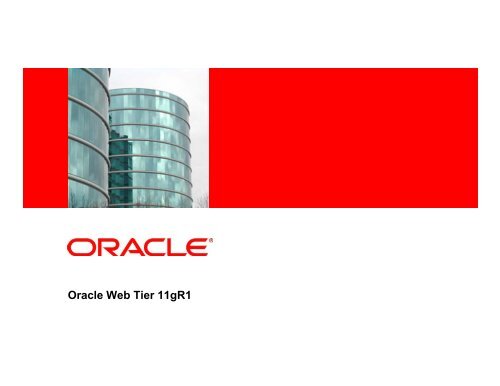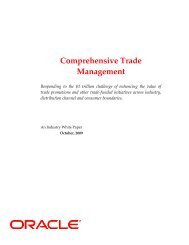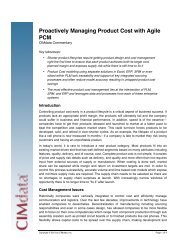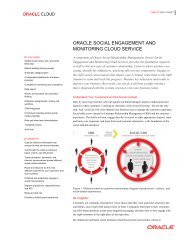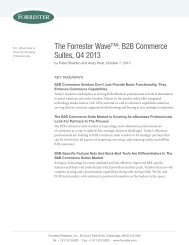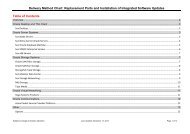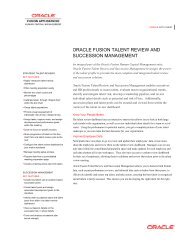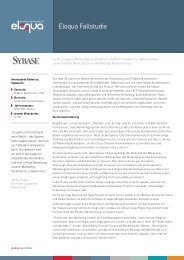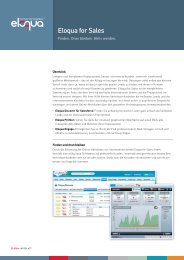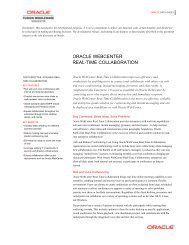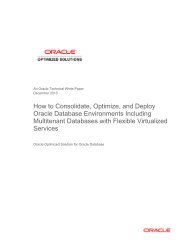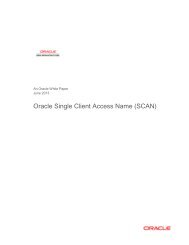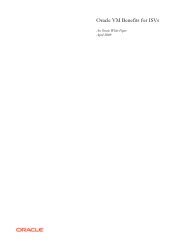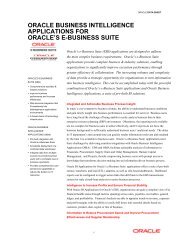Oracle Web Tier 11gR1
Oracle Web Tier 11gR1
Oracle Web Tier 11gR1
Create successful ePaper yourself
Turn your PDF publications into a flip-book with our unique Google optimized e-Paper software.
<strong>Oracle</strong> <strong>Web</strong> <strong>Tier</strong> <strong>11gR1</strong>
Agenda<br />
• What's New<br />
– What's New in <strong>Oracle</strong> <strong>Web</strong> Cache and OHS<br />
– <strong>Oracle</strong> <strong>Web</strong> Cache and OHS Bundling<br />
• <strong>Web</strong> <strong>Tier</strong> Installation Concepts and Options<br />
– Separation of Config from Binaries<br />
– <strong>Oracle</strong> <strong>Web</strong> Cache and OHS Directory Structure<br />
– Provisioning Using opmnctl<br />
• Management Tools for <strong>Web</strong> <strong>Tier</strong><br />
– Fusion Middleware Control<br />
– Opmnctl<br />
– <strong>Web</strong> Cache Manager<br />
• Verifying Ports in Use
What is <strong>Oracle</strong> <strong>Web</strong> <strong>Tier</strong><br />
• The web tier is:<br />
– Responsible for interacting with the end user<br />
• Primarily in the forms of HTTP requests and responses<br />
– The outermost tier in the application server<br />
• <strong>Oracle</strong> <strong>Web</strong> <strong>Tier</strong> comprises of two components:<br />
– <strong>Oracle</strong> <strong>Web</strong> Cache<br />
• A content-aware server accelerator, secure reverse proxy<br />
server that improves the performance, scalability, and<br />
availability of web sites<br />
– <strong>Oracle</strong> HTTP Server<br />
• Apache based web server that provides a HTTP listener for<br />
<strong>Oracle</strong> <strong>Web</strong>Logic Server and the framework for hosting static<br />
pages, dynamic pages, and applications over the web
What’s New in <strong>Oracle</strong> <strong>Web</strong> Cache <strong>11gR1</strong><br />
• Request filtering<br />
– Prevent malicious code from exploiting software vulnerabilities<br />
– Take actions on incoming requests based on request attributes<br />
• Invalidation using response headers<br />
– Invalidate cached content through an HTTP response header<br />
• Request-based logging<br />
– Writes requests in bulk after the request to the event logs<br />
• ODL format for event logs<br />
– Uses ODL format for all diagnostic messages and log files<br />
• Audit logging<br />
– Supports the Common Audit Framework for administering audits<br />
across FMW components<br />
• Secure caching<br />
– Supports caching contents that are secured by OSSO authentication<br />
• Can be configured using MBeans
What’s New in <strong>Oracle</strong> HTTP Server <strong>11gR1</strong><br />
• Now based on Apache v2.2<br />
• Comes integrated with WLS Plug-in for routing to WLS<br />
– Tested with WLS 10.3.1 but should work with any version<br />
• Can be configured using MBeans<br />
• ODL format for event logs<br />
– Uses ODL format for all diagnostic messages and log files<br />
• Audit logging<br />
– Supports the Common Audit Framework for administering audits<br />
across FMW components<br />
• Does not support routing to OC4J<br />
– Mod_oc4j is no longer shipped and supported<br />
• Does not come with PHP anymore<br />
– Mod_php is still support but is not bundled with OHS<br />
– Instructions to integrate PHP with OHS available here:<br />
• http://www.oracle.com/technology/products/ias/ohs/htdocs/php_ohs.htm
<strong>Oracle</strong> <strong>Web</strong> Cache and OHS Bundling<br />
• <strong>Oracle</strong> <strong>Web</strong> Cache and OHS <strong>11gR1</strong> available from two FMW packages<br />
• <strong>Oracle</strong> Fusion Middleware <strong>Web</strong> <strong>Tier</strong> and Utilities DVD<br />
– Primary source to obtain OHS and <strong>Web</strong> Cache<br />
– Installed and configured independent of other components<br />
• Choice of associating (for mgmt via EM) with any WLS domain<br />
– mod_plsql and mod_osso are disabled OOTB (can be enabled)<br />
• <strong>Oracle</strong> Portal, Forms, Reports and Discoverer DVD<br />
– Some of these components have dependency on WC and OHS<br />
– Installed and configured automatically<br />
• Auto associated (for mgmt via EM) with WLS domain configured for this<br />
package<br />
– Can not install just WC or OHS out of this package<br />
– Can create additional WC and OHS components post install<br />
– mod_plsql and mod_osso are enabled and configured OOTB
Agenda<br />
• What's New<br />
– What's New in <strong>Oracle</strong> <strong>Web</strong> Cache and OHS<br />
– <strong>Oracle</strong> <strong>Web</strong> Cache and OHS Bundling<br />
• <strong>Web</strong> <strong>Tier</strong> Installation Concepts and Options<br />
– Separation of Config from Binaries<br />
– <strong>Oracle</strong> <strong>Web</strong> Cache and OHS Directory Structure<br />
– Provisioning Using opmnctl<br />
• Management Tools for <strong>Web</strong> <strong>Tier</strong><br />
– Fusion Middleware Control<br />
– Opmnctl<br />
– <strong>Web</strong> Cache Manager<br />
• Verifying Ports in Use
Separation of Config from Binaries<br />
• Separation of Config from Binaries<br />
– Unlike prior releases where binaries and config stayed together<br />
• Two key terms:<br />
– <strong>Oracle</strong> Home (read only files)<br />
• Binaries and other files created at install time and never<br />
changes<br />
• Location represented by ORACLE_HOME env. variable<br />
– <strong>Oracle</strong> Instance (updateable files)<br />
• A collection of system components managed by OPMN<br />
• Contains configuration files, log files, static contents, temp<br />
files<br />
• Location represented by ORACLE_INSTANCE env. variable
Multiple <strong>Oracle</strong> Instances per <strong>Oracle</strong> Home<br />
• Can create multiple <strong>Oracle</strong> Instances per <strong>Oracle</strong> Home<br />
<strong>Oracle</strong> Instance<br />
<strong>Web</strong><br />
Cache<br />
OHS<br />
Instance<br />
Home<br />
Config<br />
Cache<br />
<strong>Oracle</strong> Instance<br />
OHS<br />
OHS<br />
Instance<br />
Home<br />
Config<br />
Cache<br />
OPMN<br />
Logs<br />
OPMN<br />
Logs<br />
<strong>Oracle</strong><br />
Home<br />
Binaries, Read Only Files
<strong>Web</strong> <strong>Tier</strong> <strong>Oracle</strong> Instance<br />
• A web tier <strong>Oracle</strong> Instance contains<br />
– One OPMN<br />
– 0 or more system components (such as OHS and <strong>Web</strong><br />
Cache)<br />
• OPMN manages all system components of an <strong>Oracle</strong><br />
Instance<br />
OHS1<br />
<strong>Web</strong> <strong>Tier</strong> Instance<br />
OPMN<br />
OHS2<br />
<strong>Web</strong>Cache1
<strong>Web</strong> <strong>Tier</strong> Installation Options<br />
• Installation and configuration can be done separately<br />
– Install Only (DVD/Disk1/runInstaller)<br />
• Installs the product binaries in an <strong>Oracle</strong> Home<br />
• All component binaries from the package are installed<br />
– Install and Configure (DVD/Disk1/runInstaller)<br />
• Installs the product binaries in an <strong>Oracle</strong> Home<br />
– All component binaries from the package are installed<br />
• Creates and configures an instance in an <strong>Oracle</strong> Instance<br />
– Choose what components get configured<br />
– Configure Only ($ORALE_HOME/bin/config.sh)<br />
• Creates and configures an instance in an <strong>Oracle</strong> Instance<br />
– Choose what components get configured
<strong>Web</strong> <strong>Tier</strong> Installation Options Cont.<br />
• Associating <strong>Oracle</strong> Instance with WLS domain<br />
– Two options to configure a web tier <strong>Oracle</strong> Instance<br />
– Associate with WLS domain<br />
• Allows system components to be managed via EM<br />
• A (JRF enabled) WLS domain needs to be pre-configured<br />
– Deploys system components’ MBeans in Admin Server<br />
• Also loosely referred as “EM managed” mode<br />
• Does NOT configure OHS to route requests to that WLS<br />
domain<br />
– Do not associate with WLS domain<br />
• Can not manage system components via EM<br />
• Components can still be managed via CLI (opmnctl)<br />
• Also loosely referred as “non-EM managed” mode
General <strong>Web</strong> <strong>Tier</strong> Install Flow<br />
• Go directly to step #5 if:<br />
– If you already have a JRF-enabled WLS domain configured, or<br />
– Do not want to manage web tier instance via FMW Control<br />
1. Install WLS:<br />
– Create a new MW Home<br />
– Choose "Typical" install option<br />
2. Install SOA or <strong>Web</strong> Center Suite:<br />
– Run /Disk1/runInstaller.sh<br />
– For JDK location you could provide JDK from above WLS install<br />
(/jdk160_11)<br />
3. Configure WLS Domain and EM (from SOA or <strong>Web</strong> Center <strong>Oracle</strong><br />
Home):<br />
– Run /common/bin/config.sh<br />
– Create a new domain (choose "Create a new <strong>Web</strong>logic Domain")<br />
– Select only EM and JRF to configure
General <strong>Web</strong> <strong>Tier</strong> Install Flow Cont.<br />
4. Start WLS Admin Server<br />
– Run /bin/start<strong>Web</strong>Logic.sh<br />
5. Install and Configure <strong>Web</strong><strong>Tier</strong><br />
– Run /Disk1/runInstaller.sh<br />
– Choose Install and Configure option<br />
– Select both OHS and <strong>Web</strong> Cache components<br />
– If configuring instance to be managed via FMW Control:<br />
• Select "Associate Selected Components with <strong>Web</strong>Logic Domain"<br />
• Provide WLS Admin Server details (domain that you created in #3<br />
above
Middleware Home Directory Structure<br />
Middleware Home<br />
<strong>Web</strong> <strong>Tier</strong> <strong>Oracle</strong> Home WLS Home User Projects SOA Home<br />
Domains<br />
<strong>Oracle</strong> Instance<br />
OHS<br />
EM Domain<br />
<strong>Web</strong> Cache<br />
Admin Server<br />
soa_server1<br />
* This is one of the many possible combinations for MW home directory structure
<strong>Web</strong> Cache Directory Structure - <strong>Oracle</strong> Home<br />
Directory<br />
webcache/bin<br />
webcache/tem<br />
plates<br />
webcache/files<br />
Contents<br />
• <strong>Web</strong> Cache binary files<br />
• For example, webcached and webcachea<br />
• <strong>Web</strong> Cache template configuration files<br />
• For example, webcache.xml, auditconfig.xml etc.<br />
• Get provisioned to an <strong>Oracle</strong> instance at WC creation<br />
• These files should only be edited by advanced users<br />
• <strong>Web</strong> Cache template static files<br />
• For example, error pages<br />
• Get provisioned to an <strong>Oracle</strong> instance at WC creation<br />
• These files should only be edited by advanced users
<strong>Web</strong> Cache Directory Structure - <strong>Oracle</strong> Instance<br />
Directory<br />
bin<br />
config/<strong>Web</strong>Cache/<<br />
webcache_name><br />
config/<strong>Web</strong>Cache/<<br />
webcache_name><br />
/files<br />
diagnostics/logs/We<br />
bCache/<br />
Contents<br />
• opmnctl executable for the instance<br />
• <strong>Web</strong> Cache configuration files<br />
• For webcache.xml, auditconfig.xml etc.<br />
• Static content<br />
• For example, error pages<br />
• Log files<br />
• For example, event log, access log and console log
OHS Directory Structure - <strong>Oracle</strong> Home<br />
Directory<br />
ohs/bin<br />
ohs/conf<br />
ohs/htdocs<br />
ohs/modules<br />
Contents<br />
• OHS binary files<br />
• For example, apachectl, rotatelogs, httpd, apxs etc.<br />
• OHS template configuration files<br />
• For example, httpd.conf, ssl.conf, mod_wl_ohs.conf etc.<br />
• Get provisioned to an <strong>Oracle</strong> instance at OHS creation<br />
• These files should only be edited by advanced users<br />
• OHS template static files<br />
• For example, welcome pages, error docs etc.<br />
• Get provisioned to an <strong>Oracle</strong> instance at OHS creation<br />
• These files should only be edited by advanced users<br />
• Modules .so files<br />
• For example, mod_wl_ohs.so, mod_osso.so etc.
OHS Directory Structure - <strong>Oracle</strong> Instance<br />
Directory<br />
bin<br />
config/OHS/<br />
config/OHS//htdocs<br />
config/OHS//moduleconf<br />
diagnostics/logs/OH<br />
S/<br />
Contents<br />
• opmnctl executable for the instance<br />
• OHS configuration files<br />
• For example, httpd.conf, mod_wl_ohs.conf, ssl.conf<br />
etc.<br />
• Static content and CGI scripts<br />
• For example, welcome pages, error docs etc.<br />
• Configuration files that get automatically included<br />
• Don’t put any files with a .conf extension here that<br />
shouldn’t be included<br />
• Log files<br />
• For example, error log, access log and console log
Provisioning Using opmnctl<br />
• Use opmnctl to provision <strong>Oracle</strong> Instances and system components<br />
• Create a new <strong>Oracle</strong> Instance<br />
$ opmnctl createinstance -oracleInstance /oracle/inst1<br />
-adminHost myahostname -adminPort 7001 -<br />
adminRegistration ON<br />
• Register and unregister an <strong>Oracle</strong> instance with a <strong>Web</strong>Logic<br />
domain<br />
$ opmnctl registerinstance -adminHost myhostname<br />
-adminPort 7001<br />
• Create and delete a system component<br />
$ opmnctl createcomponent -componentType OHS -<br />
componentName ohs2<br />
$ opmnctl deletecomponent -componentName ohs2
Provisioning Using opmnctl Cont.<br />
– Ports are automatically assigned at create time<br />
– Define your own ports using additional parameters:<br />
• For OHS<br />
– listenPort: HTTP listening port<br />
– sslPort: HTTPS (SSL) listening port<br />
– proxyPort: Proxy MBean (admin) port<br />
• For <strong>Web</strong> Cache<br />
– listenPort: HTTP listening port<br />
– sslPort: HTTPS (SSL) listening port<br />
– wcAdminPort: admin listening port<br />
– invPort: invalidation listening port<br />
– statPort: statistics listening port<br />
• Update an <strong>Oracle</strong> instance or component registration with the <strong>Web</strong>Logic<br />
domain<br />
– Needed when e.g. OHS’s Admin/Proxy MBean port is changed<br />
$ opmnctl updatecomponentregistration -componentName ohs1 -<br />
proxyPort 8989
Agenda<br />
• What's New<br />
– What's New in <strong>Oracle</strong> <strong>Web</strong> Cache and OHS<br />
– <strong>Oracle</strong> <strong>Web</strong> Cache and OHS Bundling<br />
• <strong>Web</strong> <strong>Tier</strong> Installation Concepts and Options<br />
– Separation of Config from Binaries<br />
– <strong>Oracle</strong> <strong>Web</strong> Cache and OHS Directory Structure<br />
– Provisioning Using opmnctl<br />
• Management Tools for <strong>Web</strong> <strong>Tier</strong><br />
– Fusion Middleware Control<br />
– Opmnctl<br />
– <strong>Web</strong> Cache Manager<br />
• Verifying Ports in Use
Management Tools for <strong>Web</strong> <strong>Tier</strong><br />
• Two primary management tools<br />
– Fusion Middleware Control (EM), a GUI tool<br />
• Main tool for process management, configuration and<br />
monitoring<br />
• Manageable when instance is registered with WLS domain<br />
• Communicates with components via Proxy MBean port<br />
– opmnctl, a command-line tool<br />
• Provides process management and provisioning operations<br />
• Located at two places<br />
– $ORACLE_HOME/opmn/bin and<br />
$ORACLE_INSTANCE/bin<br />
• Recommended to be used from the $OI/bin directory<br />
– Same ORACLE_INSTANCE that component is running in
<strong>Web</strong> <strong>Tier</strong> in Fusion Middleware Control
<strong>Oracle</strong> <strong>Web</strong> Cache in Fusion Middleware Control
OHS in Fusion Middleware Control
Process Management Using opmnctl<br />
• Opmnctl can manage local instance only<br />
– As in prior releases, can not manage remote components<br />
• To start <strong>Oracle</strong> Instance (OPMN), run:<br />
$ opmnctl start<br />
• To start <strong>Oracle</strong> Instance and all components, run:<br />
$ opmnctl startall<br />
• To check status using opmnctl, run:
Process Management Using opmnctl Cont.<br />
• Starting components using opmnctl:<br />
– To start all components of an <strong>Oracle</strong> Instance<br />
$ opmnctl startproc<br />
– To start all <strong>Web</strong> Cache components in an <strong>Oracle</strong> Instance<br />
$ opmnctl startproc process-type=<strong>Web</strong>Cache<br />
– To start a specific OHS component in an <strong>Oracle</strong> Instance<br />
$ opmnctl startproc ias-component=ohs1<br />
• Stopping components using opmnctl:<br />
– To stop all components of an <strong>Oracle</strong> Instance<br />
$ opmnctl stopproc<br />
– To stop all OHS components in an <strong>Oracle</strong> Instance<br />
$ opmnctl stopproc process-type=OHS<br />
– To stop a specific <strong>Web</strong> Cache component in an <strong>Oracle</strong> Instance<br />
$ opmnctl stopproc ias-component=webcache1<br />
• To restart a specific OHS component<br />
$ opmnctl restartproc ias-component=ohs1
<strong>Web</strong> Cache Manager<br />
• FMW Control doesn’t provide configuration capabilities for all of<br />
<strong>Oracle</strong> <strong>Web</strong> Cache<br />
• <strong>Web</strong> Cache Manager is to be used for following configuration:<br />
– Invalidation<br />
– Learned rules for request filters<br />
– Resource-limit thresholds for <strong>Oracle</strong> <strong>Web</strong> Cache<br />
– Advanced security options<br />
– Invalidation<br />
– Event and access logging<br />
– Diagnostics features<br />
– Error pages to be served by <strong>Oracle</strong> <strong>Web</strong> Cache
<strong>Web</strong> Cache Manager Cont.
Agenda<br />
• What's New<br />
– What's New in <strong>Oracle</strong> <strong>Web</strong> Cache and OHS<br />
– <strong>Oracle</strong> <strong>Web</strong> Cache and OHS Bundling<br />
• <strong>Web</strong> <strong>Tier</strong> Installation Concepts and Options<br />
– Separation of Config from Binaries<br />
– <strong>Oracle</strong> <strong>Web</strong> Cache and OHS Directory Structure<br />
– Provisioning Using opmnctl<br />
• Management Tools for <strong>Web</strong> <strong>Tier</strong><br />
– Fusion Middleware Control<br />
– Opmnctl<br />
– <strong>Web</strong> Cache Manager<br />
• Verifying Ports in Use
Verifying Ports in Use<br />
• <strong>Oracle</strong> <strong>Web</strong> Cache comes with five listen ports configured:<br />
– A HTTP listening port for client requests, defaults to 7785<br />
– A HTTPS listening port for client requests, defaults to 7789<br />
– A HTTP listening port for the admin server process, defaults to 7786<br />
– A HTTP listening port for statistics monitoring requests, defaults to<br />
7787<br />
– A HTTP listening port for invalidation requests, defaults to 7788<br />
• OHS comes with three listen ports configured:<br />
– A HTTP listening port, defaults to 7777<br />
– A HTTPS listening port, defaults to 4443<br />
– An additional HTTPS listening, defaults to 9999<br />
• Proxy Mbean/Admin port, used internally by OHS to<br />
communicate with FMW Control
Verifying Ports in Use Cont.<br />
• Look at Port Usage or Port Config Page in FMW Control
Verifying Ports in Use Cont.<br />
• Verify the allocated ports from ports.prop file in<br />
$ORACLE_INSTANCE/config/OPMN/opmn directory<br />
• Use opmnctl status cmd with –l option:
References<br />
• FMW Installation Planning Guide<br />
– http://fmwdocs.us.oracle.com/doclibs/fmw/E10285_01/install.1111/b32474/toc.htm<br />
• <strong>Oracle</strong> <strong>Web</strong> <strong>Tier</strong> Installation Guide<br />
– http://fmwdocs.us.oracle.com/doclibs/fmw/E10285_01/doc.1111/e14260/toc.htm<br />
• <strong>Oracle</strong> <strong>Web</strong> Cache Admin Guide<br />
– http://fmwdocs.us.oracle.com/doclibs/fmw/E10285_01/web.1111/e10143/toc.htm<br />
• <strong>Oracle</strong> HTTP Server Admin Guide<br />
– http://fmwdocs.us.oracle.com/doclibs/fmw/E10285_01/web.1111/e10144/toc.htm<br />
• OPMN Admin Guide<br />
– http://fmwdocs.us.oracle.com/doclibs/fmw/E10285_01/doc.1111/e14007/toc.htm


